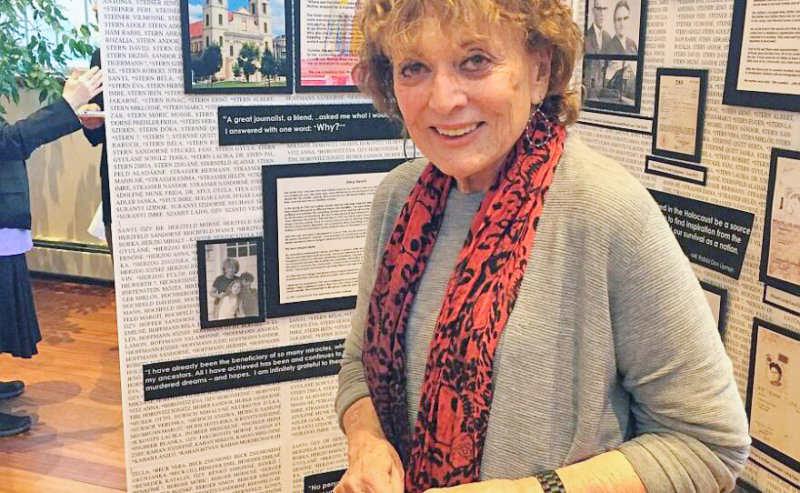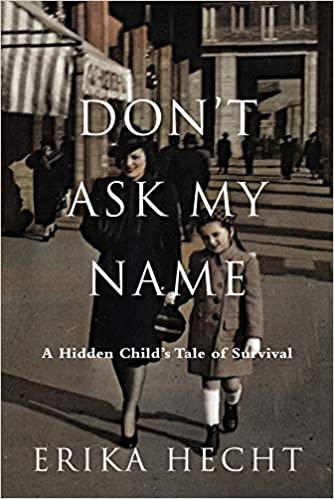What will you do to remember the Holocaust?
Last month we lost another child Holocaust survivor, Erika Hecht, as that generation finds its final resting place.
Erika recalls a story of her wartime experience in her memoir Don’t Ask My Name:
“One night, my mother wakes me and asks me my name.
“‘Erika Bleier,’ I say.
“‘What did you say?’ she asks. Her voice is dangerous.
“‘Erika Bleier,’ I repeat fearfully, realizing too late that I made a mistake. Even to her I was supposed to lie and use my fake name, Erika Bankuti. Her anger boils over. She hits me with her open palm across my face and hisses through clenched teeth, ‘If you ever make that mistake again, we will be killed!’
“I never utter that name again.”

“Don’t Ask My Name” is Erika Hecht’s book about her experiences as a Holocaust survivor.
Countless times through her childhood, Erika was moments away from her own death, and that of her immediate family, amidst bombs crashing down on either side, bullets inches away, living for days on end without food, while hiding in exile as a refugee between two warring armies.
So harrowing was Erika’s experience through the Holocaust, even her name, the very root of her identity, was taken from her. She was stripped of the fullness of her humanity. That was the Nazi ideology and terror: to strip away the humanity of the Jews and the many others, to attempt to take away dignity, and to ultimately, take away their very lives.
This past week, I had the privilege of attending a press conference at the Vermont Statehouse where the Vermont Agency of Education and the Vermont Holocaust Memorial announced the launch of the state’s first Holocaust Education Week. President and founder of the Vermont Holocaust Memorial, Debora Steinerman, said there: “It’s timelier than ever, considering increasing displays of antisemitism in Vermont and across the country.”
I experienced chills when one of the speakers at the press conference expressed dismay when an adult Vermonter, born and raised here, shared with the speaker how that person had never heard of the Holocaust before. Once again, the time is now to educate the next generation about the atrocities that took place then, not only to set the historical record straight, but because the early signs of what brought about the Holocaust — increasing antisemitism, racism and division; the assault on truth; and the erosion of democratic values and safeguards — are in clear and present danger in 2023.
This online, statewide program runs Jan. 23-27 and is meant to teach seventh through 12th grade students about the history of the Holocaust, and includes presentations by Holocaust survivors, as well as children and grandchildren of survivors.
 At our Jewish Community of Greater Stowe, we have partnered with the Hecht family, East End Press and the Vermont Holocaust Memorial, giving out complimentary copies of Erika Hecht’s haunting memoir, as we host a book reading on Jan. 28 at 5:30 p.m., in person and online, followed by a lite reception. All are invited to attend.
At our Jewish Community of Greater Stowe, we have partnered with the Hecht family, East End Press and the Vermont Holocaust Memorial, giving out complimentary copies of Erika Hecht’s haunting memoir, as we host a book reading on Jan. 28 at 5:30 p.m., in person and online, followed by a lite reception. All are invited to attend.
Marion Hecht, Erika’s daughter, will read and discuss excerpts of the recently published memoir. Copies of the memoir will be available that evening, as well as during Jewish Community of Greater Stowe office hours (M, W, Th 10-3, F 12-5). In this way, we hope to lift up Erika’s memory as she would have wanted, while remembering the heroic acts and righteous Jews and gentiles that preserved her life and other survivors.
Jan. 27 marks United Nations-designated International Holocaust Remembrance Day.
The implications of forgetting are near our doorstep. Will you do your part to never forget?
(Rabbi David Fainsilber is spiritual leader of the Jewish Community of Greater Stowe.)

